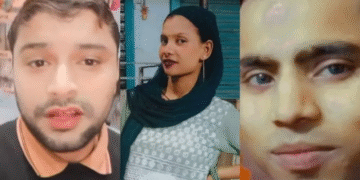A pregnant woman was stabbed by her lover in Delhi, prompting her husband to intervene and fatally stab the attacker. Here’s what happened in this shocking turn of events
In a shocking and tragic turn of events late on the night of Saturday, October 18, 2025, a violent confrontation in Delhi’s Nabi Karim area ended in two deaths and one person critically wounded. According to police reports, a pregnant woman, identified as 22‑year‑old Shalini, was stabbed to death by her former live‑in partner, 34‑year‑old Aashu alias Shailendra, in broad daylight near Qutub Road. In the ensuing struggle, her husband, Aakash, intervened, and ended up killing Aashu by using the same knife. The incident has sparked outrage and grief among residents, and raised serious questions about relationship violence, possessiveness, and the adequacy of protective measures.
Timeline of the incident
- According to the police, the violent episode unfolded at around 10:15 pm on Saturday near Qutub Road in the Nabi Karim locality of Central Delhi.
- Shalini and her husband Aakash were reportedly on their way to meet Shalini’s mother, named as Sheila.
- At that moment, Aashu allegedly arrived at the scene and first attacked Aakash with a knife. Aakash managed to dodge the initial blow. Then Aashu turned his attention to Shalini, who was seated in an e‑rickshaw, and threatened her. The attacker then stabbed Shalini multiple times.
- In the ensuing fight, Aakash too was stabbed by Aashu, but he managed to wrestle away the knife and stabbed Aashu during the scuffle. All three were rushed to the hospital by Shalini’s brother Rohit and others. At the hospital, both Shalini and Aashu were declared dead on arrival; Aakash remains under treatment for his injuries.
Background & motives
The relationships involved
Police investigations revealed that Shalini and Aakash had earlier faced marital difficulties, during which Shalini reportedly entered into a live‑in relationship with Aashu outside Delhi. Later, she reconciled with Aakash, returned to him, and the couple had two children together.
Meanwhile, Aashu is said to have been enraged by Shalini’s decision to return to her husband and her pregnancy. Police sources suggest that Aashu claimed he was the father of her unborn child, which added fuel to the confrontation.
The “crime of passion” label
Deputy Commissioner of Police (Central) Nidhin Valsan described the incident as “a case arising from personal enmity and relationship disputes.” The violent spike in emotions, triggered by possessiveness and rejection, appears to have culminated in this fatal confrontation.
Legal & investigation details
- A case has been registered at the Nabi Karim Police Station under sections 103‑1 (murder) and 109‑1 (attempt to murder) of the Bharatiya Nyaya Sanhita (BNS).
- The police flagged that Aashu was already on record as a “bad character” with prior criminal cases, while Aakash also has three previous criminal cases according to officials.
- Investigators are working to piece together the exact sequence of events, collect forensic evidence (knife, blood marks, CCTV footage) and establish motive, timelines and roles of each person involved.
Human impact & community reaction
What the local area experienced
Local residents described the scene as gruesome and shocking, given the public nature of the attack on a busy road. Some recounted hearing screams and seeing the ambulance arriving soon after.
For Shalini’s mother Sheila, the blow was devastating: “My daughter was returning home. She was pregnant. That man killed two lives … I demand strict action and government support to raise my two grandchildren,” she told police.
Broader concerns
- The fact that the incident unfolded in broad public view—on a main road near Qutub Road—raises concerns about safety in public spaces and the ease with which deadly personal conflicts can erupt into violence.
- The case spotlights the issues of intimate partner violence, live‑in relationships combined with emotional turmoil, jealousy, and the risks faced by women in reconciling past relationships.
- For the two children of Shalini and Aakash, the trauma is immeasurable: they have lost their mother, their home and are now facing a future with a father wounded and legal proceedings pending.
Legal and moral implications
Self‑defence or revenge?
One of the key legal questions is whether Aakash’s act of stabbing Aashu constitutes private defence or crosses into the territory of illegal revenge. Legal experts suggest that if Aakash can establish that his actions were a necessary response to an imminent threat to his wife’s life, it may fall under the ambit of lawful self‑defence. On the other hand, if it is seen as “revenge” post the threat, legal complications may follow.
Pregnant woman killed – aggravated offence
The killing of a pregnant woman is treated as an aggravated offence in many legal jurisdictions, and adds a layer of severity to the crime. In this case, not only was the woman pregnant, but she was also a mother of two already—making the loss even more profound.
Relationship status, live‑in histories & social context
The case also raises questions about societal attitudes toward live‑in relationships, former partners and the vulnerability of women returning to a marital relationship after separation from a live‑in partner. The emotional volatility, social stigma, attempts to claim paternity and possessiveness of the former partner created the perfect storm.
What this incident tells us about larger patterns
- According to recent reports, many incidents of extreme violence in India stem from jealousy, possession, intimate betrayal, and unsettled relationships rather than random crime. The current case fits that pattern.
- Pregnant women can be especially vulnerable when personal relationships are unstable or unresolved.
- The role of prior criminal records (in this case both parties apparently had them) is pivotal—indicating that alleged bad characters remain active and pose risk even after prior involvement in offences.
- Urban public spaces are not immune: Violence frequently erupts in busy public roads or e‑rickshaw stands, showing how fast escalating personal conflicts can become life‑threatening.
Personal‑Safety take‑aways for the community
For individuals and especially women in vulnerable relationship situations:
- Be wary of former partners who may not have moved on emotionally. Be cautious when re‑entering contact or space with them.
- Avoid solitary meetings in public at night, especially in areas with limited surveillance or quick access to help.
- Ensure travel to/from meeting spots is planned with someone aware of your location, or accompany someone trusted.
- Maintain record of threats or harassment from ex‑partners or live‑in partners—these are important for police action later.
- Know your rights—if you feel threatened, you can approach local police station for protection or file a domestic violence application.
- For husbands or partners in reconciliation situations: remain attentive to risk from third‑parties, and escalate to police if threats are made or weapons are involved.
Questions & discussions sparked by the case
- What is the duty of the police and local municipal authorities in monitoring “bad characters” (BC lists) and intervening before violence erupts?
- Should there be more focused support systems for pregnant women in conflict‑marriages or who are returning from separation?
- How do we improve safety in public transit and e‑rickshaw spaces at night, especially for women?
- Should there be stricter legal deterrents or protective orders when ex‑partners claim paternity or exert emotional/physical threat over returning spouses?
- How will the judicial process treat the husband’s act—will it be called self‑defence or retaliatory vengeance?
Looking ahead: what to monitor
- Police investigation outcome – What charges will be filed, will Aakash be arrested or treated as a victim/defender, what is the forensic evidence?
- Autopsy and forensic reports – Confirmation of pregnancy term, stab wound details, location, knife retrieval.
- CCTV and eyewitness accounts – Given that the incident happened in a public spot near Qutub Road, video footage may play a key role.
- Impact on local community – Has there been increased patrol or security in the area? Will local women feel less safe?
- Support for the children left behind – Who will take care of the kids? Will the state step in with support for them given the mother was pregnant at the time of death?
- Legal precedents – The case may be cited in future for guns/knives in intimate partner disputes, or for issues around live‑in partners and pregnancy claims.
In summary
A routine visit to a mother’s house turned into a night of violence and irreversible loss. For Shalini, the 22‑year‑old pregnant mother of two, it meant the ultimate tragedy—losing her life at the hands of a former live‑in partner. For Aakash, it was a horror: his wife stabbed, his unborn child gone, a violent fight and his attacker dead. The street in Delhi’s Nabi Karim that witnessed the confrontation now carries the memory of a “crime of passion” that ended in four lives changed forever (three dead, one wounded).
The case lays bare the fragility of personal relationships, the deadly consequences of obsession and possession, and the gaps in protective mechanisms for women in complicated domestic situations. It also raises urgent questions about how society, police and governance must respond to prevent such tragedies from recurring.
As the police investigation continues and the legal process unfolds, the wound remains open for two bereaved families, two children without a mother, and a husband grappling with survival, trauma and impending legal scrutiny.
Let this case be a wake‑up call—for vigilance in personal safety, for enhanced protection for vulnerable partners, for societal reform in how emotional conflicts are dealt with, and for recognition of the real human lives behind the headlines.
Also Read : Power bank catches fire on IndiGo flight to Dimapur while taxiing at Delhi airport















 Categories
Categories









